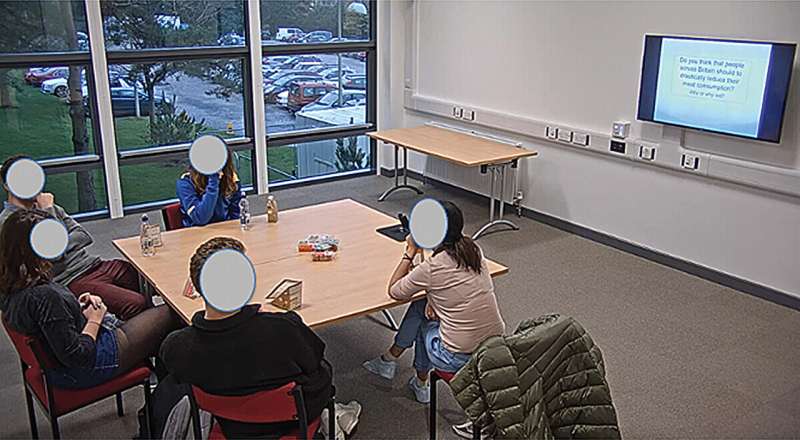This article has been reviewed according to Science X's editorial process and policies. Editors have highlighted the following attributes while ensuring the content's credibility:
fact-checked
trusted source
proofread
Focus groups can work without a moderator, research shows

Focus groups that feed views, experiences and opinions into politics, business and research might yield more open interaction and discussion within groups by moving moderators to a separate room, shows new research.
The study developed and tested a novel 'remotely-moderated' focus group method where questions are posed on a screen, and moved along by a moderator watching the group from a different room.
Dr. Annayah Prosser from the University of Bath's School of Management said, "Without the moderator, the participants seemed particularly willing to go beyond their usual role of answering questions and took over the question-asking role. Group members also extended the reach of questions in interesting ways in situations where discussion stalled.
"We found that the groups talked about things we really didn't expect them to, and that we hadn't considered before as a research team. This methodology takes the potential biases of a moderator- quite literally- out of the room and helps us focus on what the group really thinks about an issue."
The moderator has long been considered fundamental to the effectiveness of focus groups, probing answers and facilitating discussions, but, equally, researchers question whether they might hamper group interaction or inhibit group dialogue in some contexts.
The researchers say a remotely-moderated focus group can help overcome some of the problems a physically present moderator might create, while still incorporating many of the benefits moderation brings.
"When we first came up with the idea of trying to run focus groups in this way, we had a number of potential concerns," said Dr. Tim Kurz from the University of Western Australia's School of Psychological Science, who was a senior collaborator on the study. "Would people actually talk? Would they stay 'on topic'? Would the participants feel comfortable with the situation?
"However, we were blown away by not only how smoothly the conversations flowed but also how useful the kinds of qualitative data being produced were for exploring all sorts of potentially interesting and important research questions. It turns out that, sometimes, the best thing that you can do as a qualitative researcher is to just get out of the way and let participants talk among themselves!"
The team say many of the attributes that make a moderator a successful discussion manager are already familiar to people in the social rules and cues that lead to meaningful group conversations in our everyday lives: ensuring that everyone has a chance to speak, that everyone is respected and that no one person dominates.
"We were concerned that participants might mostly agree with each other to alleviate any social awkwardness or tension in the group," said Prosser. "In fact, we found that without a moderator present, there was still some conflict in opinion throughout the groups, which then necessitated management by the participants themselves, rather than 'through' a moderator. It gives us access to a rather novel and rich form of 'fly on the wall' data for understanding how disagreements work, group boundaries and motivations, and how people interact."
The study, published in Qualitative Research in Psychology set up two remotely-moderated focus group designs. The first exploring dietary identity between groups of vegans, vegetarians and flexitarians, and a second context exploring gendered experiences of sexual harassment.
Over the course of the focus groups, participants were presented (remotely) with a number of questions via a screen presentation. The researcher aimed to provide about five minutes of discussion time for each question but had the flexibility to advance the slides sooner or later depending on the flow of the discussion.
Small silences were ignored by the researchers, as they found that some silences led to subsequent interesting discussion. However, the slide was advanced for longer periods of awkward silence (over 60 seconds) to ensure group rapport did not suffer.
The study team recommend that researchers hoping to use this method are mindful of the types of conflict that may occur within groups, and make plans for how to intervene in the event of discriminatory or hateful speech and actions.
They add that the methodology might not always be suitable for topics of research where participants are more vulnerable. Offering participants a discreet way to alert the moderator to their discomfort- for example by giving them remote buttons they can use to 'bring the researcher in' if need be- may be effective.
More information: Annayah M.B. Prosser et al, 'Talk amongst yourselves': designing and evaluating a novel remotely-moderated focus group methodology for exploring group talk, Qualitative Research in Psychology (2023). DOI: 10.1080/14780887.2023.2257614
Provided by University of Bath




















